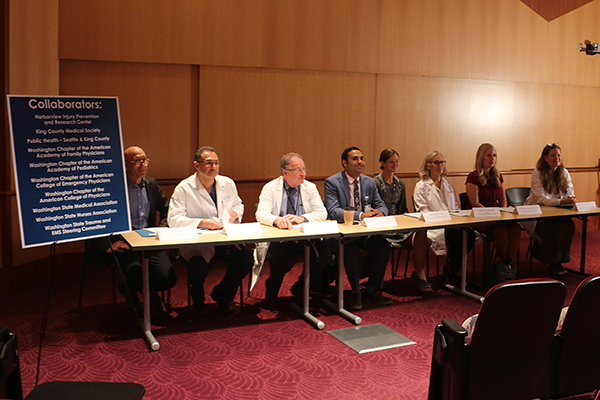Among other things, HIPRC researches and performs community outreach surrounding safe usage and storage of firearms. We do not have a position on or advocate policies surrounding gun ownership.


Harborview Injury Prevention and Research Center joined ten other healthcare provider organizations today in a pledge to work to reduce firearm injury and death.
The collaboration, led by Public Health – Seattle & King County with support from HIPRC, seeks to use a public health approach to mobilize physicians, researchers, communities and families around prevention education and strategies, such as suicide prevention, patient education and safe firearm storage.
“At Harborview Injury Prevention and Research Center, we are steadfast in our mission of injury prevention,” said HIPRC Director Monica Vavilala, M.D., who is also a UW Medicine professor of pediatrics, anesthesiology and pain medicine. “In the case of guns, we know that many accidental shootings and suicides are preventable. All it takes is a simple action: we need to store guns safely and securely.”
One initial goal will be to provide specific recommendations and guidelines to physicians and healthcare providers on identifying patients with risk factors for firearm-related injury, educating patients and families about firearm safety and promoting successful prevention strategies.
The collaboration also has the goal of “Fostering multidisciplinary and community collaborations with stakeholders interested in reducing firearm-related injury and death, including gun-owners,” according to a statement.
At the announcement of the pledge today at Harborview Medical Center, HIPRC core members Beth Ebel, M.D., MPH, Fred Rivara, M.D., MPH, and Saman Arbabi, M.D., MPH, also voiced support of the collaboration and the need for research and prevention around firearm injuries.
Rivara identified gaps in current research, including the need to evaluate the impact of existing policies and to calculate costs to the state of firearm injuries.
Ebel discussed the need for families and individuals to be informed and involved in firearm injury prevention in their communities and homes.
“We need to figure out how we’re going to care for each other in this way,” she said, noting that firearm deaths are usually preventable.
All three emphasized the importance of using evidence-based strategies to prevent firearm injuries before the patients reach Harborview Medical Center or other hospitals.
“Washington State has one of the best organized trauma systems and emergency medical response teams with significantly better survival rates,” Arbabi, who also spoke on behalf of the Washington State Trauma and EMS Steering Committee, said in a statement. “We recognize prevention is an important part of any mature trauma system, and the Washington State Trauma and EMS Steering Committee supports sensible measures to decrease gun violence.”
Read more in the full announcement from Jeff Duchin, M.D., at Public Health – Seattle & King County.